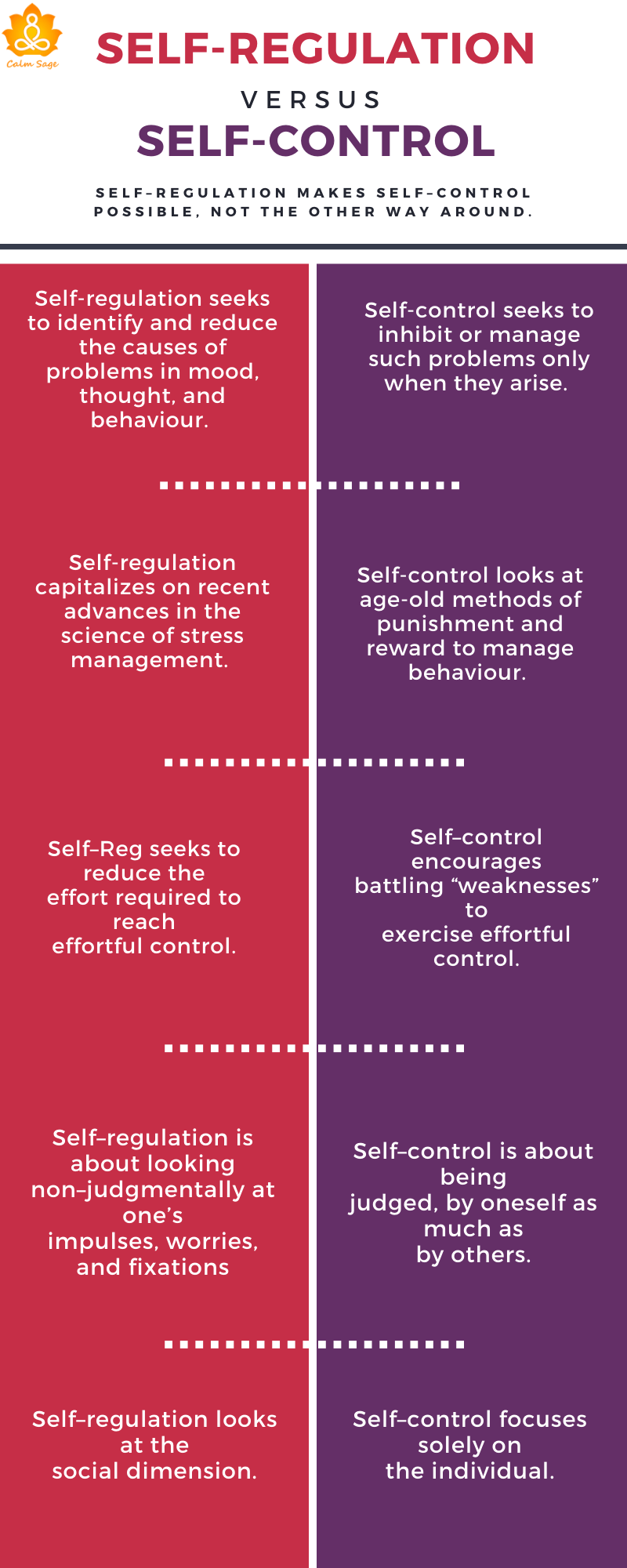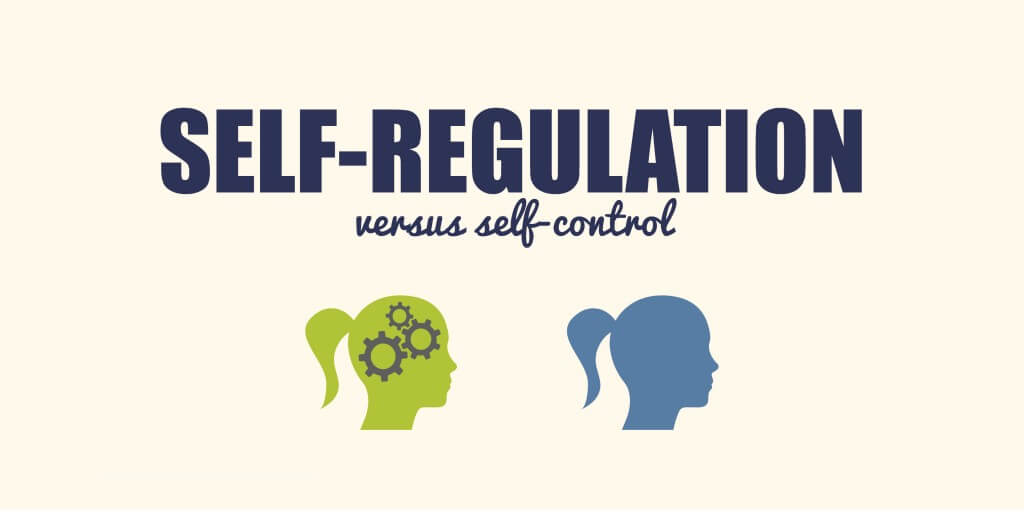Self Regulation Vs Self Control
Self Regulation Vs Self Control: Understanding the Key Differences
Introduction
Self-regulation and self-control are two important psychological concepts that play a significant role in our daily lives. While they may seem similar at first glance, there are distinct differences that set them apart. In this article, we will delve into the definitions, characteristics, and benefits of both self-regulation and self-control, shedding light on their impact on personal and professional development.
What is Self Regulation?
Self-regulation refers to the ability to manage and control one's own thoughts, feelings, and behaviors in order to adapt to the demands of various situations. It involves being aware of one's emotions and impulses and deliberately directing them towards positive and constructive outcomes.
Self-regulation is often associated with emotional intelligence, discipline, and long-term goal attainment. It enables individuals to navigate challenges, resist temptations, and make rational decisions. By regulating their thoughts, emotions, and actions, individuals can effectively cope with stress, maintain healthy relationships, and achieve personal and professional success.
Characteristics of Self Regulation
Self-regulation manifests in various ways and possesses several key characteristics:
- Awareness: Self-regulation starts with self-awareness – recognizing one's emotions, thoughts, and behaviors in different situations.
- Impulse Control: It involves restraining impulsive responses and managing immediate desires to align with long-term goals.
- Adaptability: Self-regulated individuals adapt to new circumstances and make necessary adjustments to fit changing environments.
- Emotional Regulation: Managing emotions and handling stressful situations with composure and resilience is crucial for self-regulation.
- Delayed Gratification: Self-regulated individuals can postpone immediate rewards for greater long-term benefits.
What is Self Control?
Self-control is the ability to refrain from impulsive or instinctive responses in order to achieve specific goals. It involves resisting temptations, managing urges, and exerting conscious control over one's actions. While self-regulation encompasses a broader set of skills, self-control focuses on managing impulsivity and immediate gratification.

Self-control is vital in various aspects of life, such as healthy eating habits, financial management, and maintaining interpersonal boundaries. It involves making deliberate choices rather than relying on impulsive reactions, leading to enhanced personal growth and improved decision-making abilities.
Characteristics of Self Control
The following characteristics define self-control:
- Delayed Gratification: Self-control involves the ability to resist immediate gratification in order to achieve long-term goals.
- Willpower: It requires conscious effort and willpower to resist impulsive behaviors.
- Behavioral Choices: Self-control is demonstrated through the conscious choice of one behavior over another to achieve desired outcomes.
- Decision Making: It involves weighing the costs and benefits of immediate gratification versus long-term rewards.
- Motivation: Self-control is driven by a strong motivation to achieve specific goals or adhere to personal values and principles.
Key Differences Between Self Regulation and Self Control
While self-regulation and self-control share similarities, understanding their differences is essential:
- Scope: Self-regulation encompasses a wider range of skills, including emotional regulation and adaptability, while self-control focuses more on managing immediate impulses and gratification.
- Long-Term Goals: Self-regulation is often associated with setting and achieving long-term goals, whereas self-control is primarily concerned with resisting immediate temptations.
- Emotional Component: Self-regulation places significant emphasis on managing and regulating emotions, while self-control is more focused on managing behaviors and impulses.
- Flexibility: Self-regulation allows for flexibility and adaptive responses, while self-control often involves strict restraint and resistance to immediate impulses.
The Benefits of Self Regulation and Self Control
Developing both self-regulation and self-control skills can bring about several benefits:
1. Improved Emotional Well-being
Self-regulation enables individuals to recognize and manage negative emotions effectively, resulting in improved overall emotional well-being and reduced stress levels. On the other hand, self-control helps individuals handle impulsive emotions, preventing regrettable actions that may lead to long-term emotional distress.
2. Enhanced Decision-Making Skills
Both self-regulation and self-control contribute to better decision-making abilities. Self-regulation allows individuals to think rationally and critically, considering all relevant factors before making a decision. Self-control, on the other hand, helps individuals overcome impulsive decision-making and opt for choices that align with their long-term goals.
3. Increased Personal and Professional Success
Self-regulated individuals are more likely to experience personal and professional success due to their ability to set long-term goals, persist through challenges, and adapt to changing situations. Self-control plays a complementary role by enabling individuals to resist distractions, maintain focus, and achieve desired outcomes.
By developing a balance between self-regulation and self-control, individuals can lead more productive, fulfilling, and successful lives.
FAQ
Q: Can self-regulation and self-control be learned?
A: Yes, both self-regulation and self-control are skills that can be learned and developed with practice and conscious effort. Various strategies, such as mindfulness, goal-setting, and cognitive-behavioral techniques, can facilitate the enhancement of these skills.
Q: How can self-regulation and self-control contribute to effective stress management?
A: Self-regulation allows individuals to identify and manage stress triggers effectively, while self-control helps individuals abstain from impulsive reactions that may exacerbate stress. By combining these skills, individuals can develop healthier coping mechanisms and achieve greater overall well-being.
Q: Can someone possess self-control but lack self-regulation?
A: While self-regulation and self-control often go hand in hand, it is possible for an individual to exhibit self-control in certain situations without possessing overall self-regulation abilities. However, it is important to develop both skills to experience the full range of benefits in personal and professional life.
Conclusion
Self-regulation and self-control are essential skills that contribute to personal growth, emotional well-being, and overall success. While self-regulation encompasses a broader range of abilities, self-control focuses on managing immediate impulses and gratification. By developing these skills, individuals can make better decisions, cope with stress effectively, and achieve their long-term goals. With practice and conscious effort, anyone can enhance their self-regulation and self-control abilities, leading to a more fulfilling and productive life.
Self-Regulation Vs. Self-Control - Self-Reg
 Image Source : self-reg.ca
Image Source : self-reg.ca How To Improve Self-regulation Skills -Five Steps Of Self-regulation By
 Image Source : www.pinterest.com
Image Source : www.pinterest.com regulation self skills strategies steps reg emotional shanker stuart children behaviour five stressors social learning ca choose board dr reduce
Infographic: Self-Reg Vs. Self-Control - Self-Reg With Dr. Stuart
 Image Source : www.pinterest.com
Image Source : www.pinterest.com infographic regulation infographics counselor psychology
What Is Self Regulation: 15 Psychology Based Self-Regulation Techniques
 Image Source : www.calmsage.com
Image Source : www.calmsage.com self regulation control techniques adults vs psychology children based
What Is Self-Regulation And Why Do You Want To Develop This Skill
 Image Source : www.healingcollective.ca
Image Source : www.healingcollective.ca self regulation control kindermusik infographic vs
The Shanker Method (@ShankerMethod) | Twitter
 Image Source : twitter.com
Image Source : twitter.com shanker self control method twitter reply retweets likes
Self-control
self control regulation being
Self-Regulation Vs. Self-Control - The Fantastic Life
 Image Source : thefantasticlife.com
Image Source : thefantasticlife.com The shanker method (@shankermethod). Self regulation control techniques adults vs psychology children based. Self-regulation vs. self-control. How to improve self-regulation skills -five steps of self-regulation by. What is self-regulation and why do you want to develop this skill